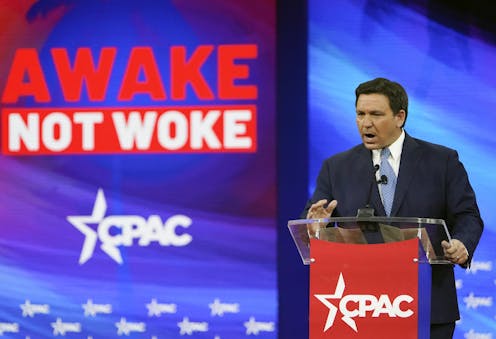Why 'wokeness' has become the latest battlefront for white conservatives in America
- Written by Emma Shortis, Lecturer in Social and Global Studies, RMIT University

The day he launched his bid[1] for the Republican nomination for the 2024 US presidential election, Florida Governor Ron DeSantis warned Fox News viewers “the woke mind virus is basically a form of cultural Marxism.”
With his trademark subtlety, DeSantis was pitching himself to the Republican base that still supports Donald Trump, the current front-runner for the nomination.
For those in the know, it was a signal. With a President DeSantis, there would be no more critical race theory. There would be fewer protections for LGBTQIA+ people. And there would be no more troubling ambiguity in textbooks or any suggestion the United States is anything other than the greatest country on earth, and always has been, and is going to be made great again. Or even greater.
Welcome to the “War on Woke”.
On Fox, DeSantis was trying to claim that he, not Trump, is the leading general in this war. But he is far from alone. Across the country, Republican-led state legislatures are unleashing a tidal wave of laws intended to enforce white conservative mores on the broader population.
The “war on woke” has involved brazen attacks on academic freedom[2] in universities and schools; on the rights of transgender people, particularly children, to gender-affirming health care[3]; and on any person, group or business deemed too liberal – even Mickey Mouse[4].
These shifting battlefronts are underpinned by a concerted effort to erase any form of American history that considers the racism and inequity of the country’s past and present. The teaching of “critical race theory[5]” is being banned in many states, “divisive concepts” are no longer allowed in school curricula and any history that explores inequality is being expunged from school textbooks.
Though it may seem it, this war on woke is not new.
In the 1950s, William Faulkner, the American novelist whose Southern Gothic fiction was haunted by the legacy of slavery, wrote: “The past is never dead. It’s not even past.” Zealous conservatives have banned Faulkner’s books from school curricula on multiple occasions for obscenity and blasphemy[6].
Today’s “war” is part of a much longer fight - one that has dominated America’s past, and continues to shape the possibilities of its future.
What is the “war on woke”?
In Iowa last month, Trump lamented[7] the constant repetition of “woke, woke, woke,” complaining that “it’s just a term they use. Half the people can’t define it; they don’t know what it is.”
As he so often does, Trump inadvertently highlighted the confounding and contradictory nature of American politics today.
The term “woke” can be either an insult or a marker of pride – it can shift depending on the context. Both those broadly aligned with “woke” aims and those in bitter opposition to them appear to find it equally difficult to define the term.
As the journalist and author Michael Harriot has explained, the term “woke” emerged from the African American maxim “stay woke[8]”. That is, a call to stay aware of the lived reality of racism in the United States. More recently, the meaning has drifted and now signifies broad commitment to social justice awareness and activism.
It’s not surprising it has drawn the opprobrium of a conservative right that is obsessed with entrenching its moral coda as not just the dominant ethic, but the law of the land.
So how do conservatives define “wokeness” and articulate the terms of their opposition? The simple answer is they don’t. Many conservatives instead compare “wokeness” with a sickness, which is a way of associating those seeking to ameliorate social injustices with degradation, decay and moral turpitude.
The slippery nature of the term “woke” is useful to those wishing to prosecute a war against anything that strays outside the rigid confines of conservative ideology. Its adaptability and malleability are crucial to its pervasiveness.
From civil war to civil rights
But this is hardly the first time in American history that states have passed regressive laws seeking to wind back social gains made at the federal level.
The United States has never been one country[9]. The dispersed, state-level battlefronts of the “war on woke” reflect this historical reality.
The country was born as an uneasy alliance of settler-colonies based on imperial expansion and dispossession. The white establishment in both the north and south benefited from slavery, but there was a crucial difference: the south’s entire economic foundation and social structure was built on it. The north’s was not.
This created a fundamental tension between the two social systems that in the mid-19th century erupted into outright conflict.
Depicting themselves as the victims of northern aggression, white southerners insisted they were simply seeking to protect their way of life. This meant not just the maintenance, but the expansion, of slavery.
The “carpetbaggers” from the north, meanwhile, were imposing an unjust and unwanted way of life on the south. This was a cultural construction that would endure long after the Civil War.
After losing the war, white southern leaders found new ways to assert power, through Jim Crow[10] laws and the continued brutal oppression of African Americans and other racial minorities.
In the 1960s, the civil rights movement began to challenge these discriminatory laws. The backlash was swift. And it was, again, about a white minority population seeking to utilise the unequal mechanisms of the American constitutional order to maintain their authority.
Loudly proclaiming “states rights”, they inveighed against the white northern elite once again interfering, so they alleged, with their way of life.
Conservatism was cohering into a new social movement, premised on the rejection of the advances of the civil rights movement. Its adherents despised all those they perceived as a threat to the social order they sought to (re)create: mobilised Black Americans, feminists, lesbians and gays, migrants and anybody else who could be broadly described as “liberal”.
Read more: The American right has gone to war with 'woke capitalism' – here's what they get wrong[11]
A new social movement is born
In a 1964 speech supporting the presidential campaign of Republican Barry Goldwater, Ronald Reagan, a rising star in the Republican Party gave voice[12] to this emerging politics:
Ronald Reagan’s ‘A Time for Choosing’ speech from 1964.This is the issue of this election: Whether we believe in our capacity for self-government or whether we abandon the American revolution and confess that a little intellectual elite in a far-distant capital can plan our lives for us better than we can plan them ourselves.
Generations of free marketers proudly repeat Reagan’s words. What they neglect to mention is this was not a simple appeal for hearty and virtuous Americans to draw on their own resources and dictate their destinies, rather than rely on ineffective government bureaucracy.
In the climate of the civil rights movement, it was a repetition of the racially coded southern call to assert the right to local self-government over interference from the central government, which was daring to support aspirations for genuine racial equality.
This was the culture war of the time. Conservatives mobilised in presidential campaigns, in student groups such as the Young Americans for Freedom, and in more insidious places, such as the John Birch Society and the Ku Klux Klan.
Most significant of all was the mobilisation in churches, as a new, white, Christian evangelical movement discovered and embraced its power[13].
Reagan sought to identify himself with this conservative social mobilisation sweeping the country, against the Republican establishment of the day. The tactic elevated him to the governorship of California and later, the White House.
This right-wing mobilisation included a forceful campaign[14] against educational materials provided by the government to school students that sought to capture the complexities of American history.
Conservative Christians also campaigned against depictions of Black oppression and assertions of non-white culture, sex education and anything that might challenge their carefully prescribed social coda.
Read more: Evangelical Christians are crucial voters in Republican primaries. Would they support DeSantis or Trump?[15]
The past is never dead
The “war on woke” is the most recent incarnation of this ongoing culture war.
The war on woke is a means of mobilisation, but also of cultural definition. By being against “wokeness”, this movement is able to construct a coherence it otherwise lacks. Devoid of a clear vision of what it stands for, this mobilisation (like other right-wing movements before it) is focused on opposition.
The starting point of this mobilisation is, and has always been, race[16]. The white supremacist “Great Replacement Theory[17]” posits that non-white populations are replacing whites through migration and demographic changes. Once a fringe conspiracy theory, it is now being openly espoused on Fox News[18].
Electoral laws are also being passed to disenfranchise Black voters[19], and bans are being placed[20] on teaching the history of how southern states maintained white power through systems of racial disenfranchisement.
Trump and DeSantis are now fuelling and feeding off this agenda as they seek to build their political careers. But they can only do so because there is a large existing social constituency for such actions, built on generations of opposition to progressive social gains.
The past is never dead. It’s not even past.
References
- ^ launched his bid (www.theguardian.com)
- ^ academic freedom (www.vox.com)
- ^ gender-affirming health care (www.npr.org)
- ^ Mickey Mouse (www.nytimes.com)
- ^ critical race theory (thehill.com)
- ^ obscenity and blasphemy (www.ala.org)
- ^ lamented (thehill.com)
- ^ stay woke (www.theguardian.com)
- ^ never been one country (www.theatlantic.com)
- ^ Jim Crow (www.pbs.org)
- ^ The American right has gone to war with 'woke capitalism' – here's what they get wrong (theconversation.com)
- ^ gave voice (www.presidency.ucsb.edu)
- ^ discovered and embraced its power (www.theguardian.com)
- ^ forceful campaign (www.theguardian.com)
- ^ Evangelical Christians are crucial voters in Republican primaries. Would they support DeSantis or Trump? (theconversation.com)
- ^ race (www.theatlantic.com)
- ^ Great Replacement Theory (www.pbs.org)
- ^ espoused on Fox News (www.adl.org)
- ^ disenfranchise Black voters (www.theguardian.com)
- ^ bans are being placed (www.facingsouth.org)













